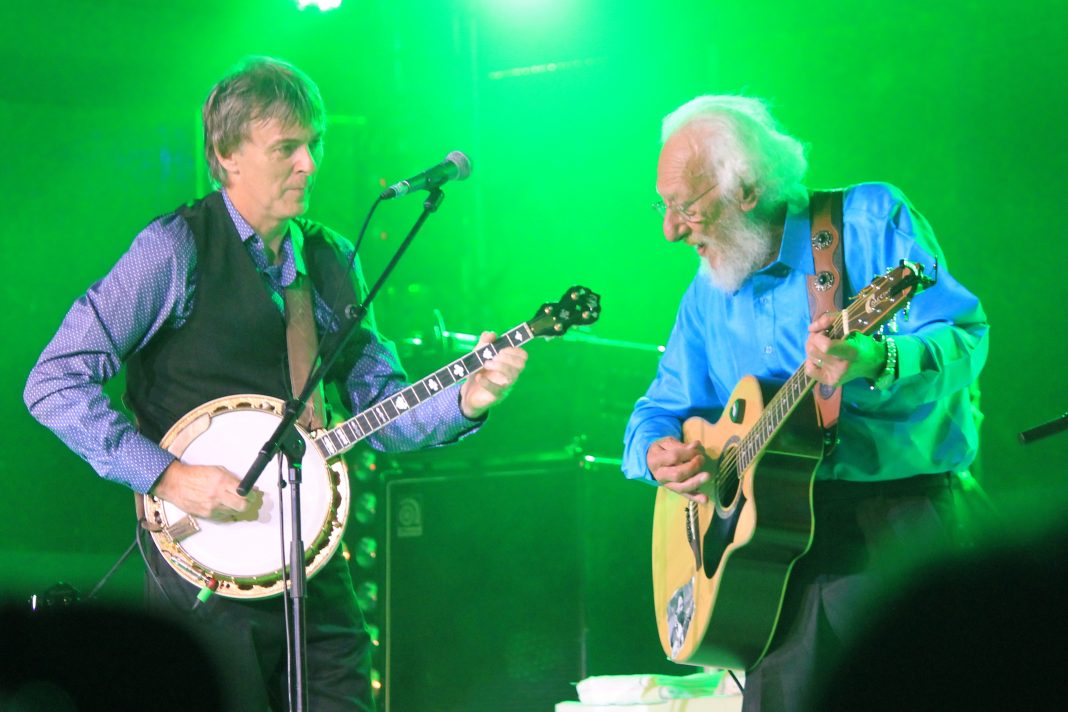The Dublin Legends, the band formed from ex-members of The Dubliners, are due to play the Customs House, South Shields, on March 24th.
Founded in 1962, The Dubliners helped popularise Irish folk music around the world with their mix of up-tempo songs, street ballads and instrumentals. Though The Dubliner’s line-up saw many changes, perhaps the band’s most famous members were the incredible vocalists Luke Kelly (1940-84) and Ronnie Drew (1934-2008).
Over the years, there were many tours and albums, appearances on Top of the Pops, and collaborations with The Pogues. The Dubliners split up in 2012 following the unexpected death of the last surviving founder member Barney McKenna.
Most of the remaining group members decided to continue touring under the name The Dublin Legends. Today there are still two ex-Dubliners in the band, Sean Cannon and Eamonn Campbell.
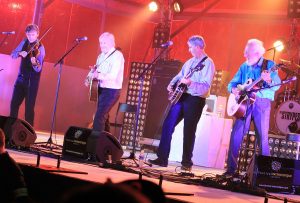
Eamonn Campbell played with The Dubliners from 1987 to 2012 and produced all their records during that time. Newcastle Magazine recently had the pleasure of catching up with Eamonn for a chat:
Is it true that you took up the guitar after hearing Elvis on Radio Luxemburg?
That’s quite true, David; that’s what set me off. I was a child of eight-years-old, I think.
So was that a magical moment for you?
Oh yeah, That’s All Right Mama, that was the song. I don’t know what it did to me – it just grabbed me, just the sound of his voice and the sound of the guitar. I didn’t realise it was Scotty Moore who played the guitar; I thought it was Elvis. I was just hooked on the guitar from then.
In 1964, you joined a showband, Dermot O’Brien and the Clubmen.
I finished school and did my Leaving Cert, which was as high as you could go at the secondary education level. By then, I’d been playing with local bands from when I was about 14 so I was able to go professional.
And you did a weekly TV show?
That’s right, a thing called Jamboree.
And when you were in The Clubmen you toured with The Dubliners.
Actually, it was the other way round; they toured with us. They’d been taken over by a guy called Phil Solomon and you probably wouldn’t remember Radio Caroline, the ship, did you ever hear of it?
It was a bit before my time.
I thought so, but this Phil Solomon guy, he owned Radio Caroline (a pirate radio station on a boat off the coast of Britain) and he literally launched The Dubliners’ career on that. Seven Drunken Nights (a successful early Dubliners’ single) was played on the air, but when we toured with them, it still hadn’t been released and he called us because the Clubmen had had a big hit in Ireland with a song called The Merry Ploughboy. It was very popular with the Irish people in England and we did a concert tour of England, which was unheard of at that time for Irish Groups, in big concert halls. We even did the Albert Hall, which was an amazing experience. So that’s how I met them.
Did you get to know Ronnie Drew and Luke Kelly?
Ah yeah, we became great friends and stayed friends over the years even though I went different ways musically with different groups; I became a session man and record producer.
What do you remember of Ronnie and Luke from those times?
Just being great company, two very intelligent men. You could sit there and have really, really good in-depth conversations. Normally, when you’re in a bar, especially the hotel bar after a gig, there’s a lot of bullshit, you know, but we could really discuss things. There were a good few pints taken as well.
You also played in an orchestra doing theatre work and TV.
Ah yeah, I played with a concert orchestra and a symphony orchestra. I was a session man, freelance, and so you’d get the call from the radio station or the manager of the concert orchestra to go and play with them or you’d get booked to do a TV series, play guitar with them. It was all very interesting; it was a great experience; musically, it was terrific.
How did it compare to being in a band?
Ah, you can’t really compare them. You know, when you’re in a band, you’re playing for people, which is great – you’re getting a great buzz, people are enjoying themselves, but when you’re playing with orchestras or doing session work it’s a different buzz. You’re just part of this amazing sound though often it’s all in the studio, no audiences.
You were a member of The Dubliners from 1987 to 2012. Obviously, that’s a good few years and I’m sure you had many experiences, but are there any particular highlights you’d pick out?
I suppose getting them together with The Pogues. That was my doing. Ronnie came to me in 86 to say The Dubliners were celebrating their 25th anniversary in 87 and would I produce an album for them? I suggested they made a double album with guests on and the one guest I wanted was The Pogues. I’d heard The Pogues and I thought if I get these two groups together, this is going to be special. I remember saying this to Ronnie and his reaction was “The Pogues! My Jesus!” It was the pot calling the kettle black from Ronnie, really. Then we did Top of the Pops and all that and then I became a member of The Dubliners without realising it.
What was working with The Pogues like?
Ah, they were great; a great bunch of lads, they really were. Shane (McGowen, The Pogues singer and main songwriter) is a highly intelligent man; you know, in those days he was doing a lot of things he probably shouldn’t have been doing, but there were times when he would be, you know, he’d be quite together and you’d have some really good chats with him. To me, Shane is more a poet than a songwriter; his lyrics are incredible, they really are.
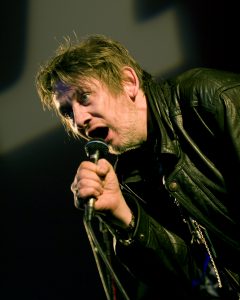
What was the experience of going on Top of the Pops (to perform The Irish Rover together with The Pogues) back in 87 like?
It was very funny. The BBC had assigned two guys to mind us and we weren’t supposed to get out of the building. There was this doorman and – I’m sure he’s long retired so I won’t get him into trouble by saying this – I slipped him a 20 pound note so we could go in and out. So every time the two guys from the BBC came into the big dressing room, there were never all twelve of us there. There were always two or three over at the pub; we were sneaking over there in shifts.
And I remember there was a group called The Fine Young Cannibals and they were looking at us as if we were something in the bloody zoo. And the other thing I was raging, really angry about was that the BBC wouldn’t let us perform live. We had to mime the bloody thing though during the rehearsals we played live and all the crew were dancing around. It was great, a great experience.
I remember seeing it on Top of the Pops when I was a kid.
Did you? Oh, by God! I was the fellah with the mad fuzzy hair.
I remember, yeah. Probably my first introduction to Irish folk music.
Oh, my God! Once seen never forgotten!
Do you see The Dublin Legends chiefly as a way of preserving The Dubliners’ legacy and bringing it to new people or as a different band with its own dynamic?
It’s a bit of both, but my reason really for keeping going is to preserve what was started by Ronnie, Luke, Ciaran and Barney, and to keep the spirit of The Dubliners alive. And on the Continent, it’s amazing – I’d say 70% of our audience easily are 35 down to 18, so there’s a whole new generation coming along. They’re really into the music; they know all the songs. It’s great; it’s great for us, you know.
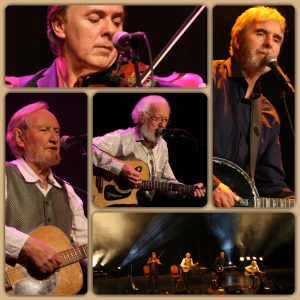
You’re a producer as well as a musician. You produced all The Dubliners’ records after 1987 as well as artists like Foster and Allen and Daniel O’Donnell. Would you say you prefer producing or do you prefer getting out and playing?
Again, as with playing with a band onstage and playing with orchestras, it’s a different kind of a buzz. When you go on stage, it’s fantastic because you see the people enjoying themselves and it’s one big party whereas the studio’s very sterile, you’re in the control room with the engineer and the tape on, but unfortunately after I joined The Dubliners, after a year or so I had to give up producing (other acts) because of the time thing. It was crazy because we were doing pretty long tours in those days and I was only just getting home then going into the studio. It was just too much.
We were talking to Tony Allen just last week.
Oh, really. Oh, Jesus! We’ve lost touch, but we were great friends. How is he?
He seemed well. He’s coming up here in March.
He’s one nice guy. I always thought he had a really unique voice. He was a pleasure to work with; he really was.
Out of all the songs you’ve played with The Dublin Legends and The Dubliners – obviously, there are many, many songs – do you have one that’s a particular favourite?
Probably The Irish Rover, for obvious reasons. Because The Dubliners, their popularity had slipped at that stage, on the Continent and that. The manager at the time christened me ‘The Resurrector’ and that song was, if you like, my 25-year present to them. From 1967, I’d always had great times with them and great admiration for Ronnie and Luke. Actually, me and Ronnie were with Luke when he died of cancer here in Dublin.
You’ve helped spread Irish folk music around world with The Dubliners and now The Dublin Legends. Why can people in so many different countries relate to it?
I think it’s fun for a start and I hope this isn’t going to come out wrong, but I think it’s more because The Dubliners promoted it; it’s not so much Irish music per se. People came to a Dubliners concert, and they saw these four or five guys on stage with beards, very ordinary guys, no gimmicks then they met them after the concerts and they were the same guys offstage as they were onstage. I think that’s very important. This stardom shit doesn’t cut with me at all; if it wasn’t for the audiences, we wouldn’t be there. You must treat your audiences with respect.
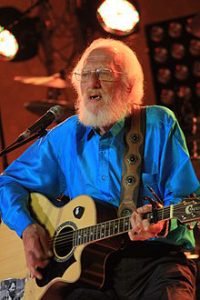
So you think it’s just the fact it seems so down to earth?
Yeah, I think that’s the thing. No bullshit, as they say in America.
You’ve been playing for a long time with The Dubliners and The Dublin Legends. You’ve done many tours, many albums. Is it ever a challenge to keep the enthusiasm up?
No, when you get on stage the adrenalin just starts going. Since 2014, I’ve had a few setbacks health-wise. I had lung cancer and I survived the operation, obviously, and then they found that I had TB and now I’ve got a thing called COPD, but I’ll keep going. My motto was always ‘bop till you drop’. That was the title, I think, of a Ry Cooder album.
I think that’s the thing with all kinds of artists. You just want to keep going, don’t you?
Oh yes, I’ve never done anything else except play the guitar. If I had to stop that … I wouldn’t stop playing, but it’s not the same sitting at home. You need other musicians with you – you spark off each other.
Thanks very much for your time, Eamonn, and we’ll look forward to seeing you in South Shields.
The Dublin Legends play the Customs House, South Shields, on March 24th, at 7.30 pm. Tickets can be purchased by phoning 0191 454 1234 or by going to www.customshouse.co.uk.
Their new album, The Dublin Sessions, featuring new recordings of a number of folk classics, is out now.

